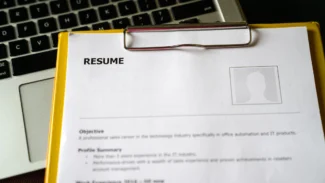Your resume should highlight your qualifications, but not every educational detail is necessary. In fact, including too much in the education section can hurt your chances.
This article covers when to remove education from a resume and how to prioritize relevance and space.
Use our AI-powered resume editor and get advice that’s tailored to your specific situation.
Key Questions for Including Education on Your Resume
Deciding what education to include on your resume can be tricky, especially when balancing relevance and space.
To help you make the right choices, consider these key questions before finalizing your education section.
1. Is my education relevant?
The first and most crucial question is whether your education directly supports the job you’re applying for. Recruiters are looking for qualifications that prove you have the skills and knowledge needed for the role.
If your degree or coursework doesn’t align with the job requirements, it could distract from your core qualifications.
For example, if you have a degree in an unrelated field but have built a career in a different industry.
It’s often better to leave that off. Similarly, high school details are generally unnecessary unless the job specifically asks for them, or if you’re early in your career and don’t have much else to include.
Always prioritize what will make you stand out as the best fit for the role.
In fact, as of January 2024, 52% of U.S. job postings on Indeed didn’t include any formal educational requirements, up from 48% in 2019. This growing trend of skills-first hiring means that focusing on relevant experience and qualifications is more important than ever.
2. Is this education obsolete?
Next, think about whether any of your qualifications have become outdated. In fast-moving industries like IT or web development, what was cutting-edge 5 years ago might be irrelevant today.
If you’ve completed courses or certifications in tools or technologies that are no longer used, it’s time to let them go. Recruiters want to see that you’re staying current with industry trends and technologies, so focus on more recent qualifications that reflect this.
For example, if you’ve recently earned a certification in a new programming language or technology, highlight that instead of older qualifications that may no longer add value.
Keeping your resume up-to-date shows employers that you’re adaptable and continuously improving.
3. Am I short on space?
If your resume is running over 1 or 2 pages, it’s time to evaluate what can be trimmed—and the education section is often a good place to start. While education is important, especially if it complements your work experience, it should not take up more space than necessary.
Cutting down on less relevant degrees or outdated qualifications can free up room for sections that might be more impactful, such as skills, achievements, or work experience.
However, removing education should be a last resort after considering other ways to condense your resume. Always ensure that what remains on the page is highly relevant to the job at hand.
4. Could I appear overqualified?
Finally, consider whether listing certain degrees could make you seem overqualified for the position. This is especially important if you’re applying for lower-skilled jobs where competition is fierce, and employers may worry about long-term commitment.
If your resume suggests you’re too qualified—such as holding an advanced degree for an entry-level role—recruiters may assume you’ll leave as soon as something better comes along.
In these cases, removing higher-level qualifications can help avoid this perception and make you seem like a more realistic fit for the position.
Tailoring your resume in this way ensures that hiring managers see you as someone who genuinely wants the job and is not just using it as a stepping stone.
When Removing or Omitting Education From Your Resume Could Hurt
While trimming your education section can free up space, it’s important to recognize when doing so might backfire. Omitting certain qualifications could make you appear underqualified or confuse recruiters about your background.
For instance, if the job specifically requires a degree or certification that you leave off, recruiters may assume you don’t meet the basic criteria.
Additionally, removing too much education could create unexplained gaps in your resume, raising red flags for hiring managers. To avoid this, always ensure that key qualifications and relevant education align with the job requirements.
Final Thoughts on Leaving Education Off Your Resume
As we’ve seen, education can be safely off your resume in many different ways. These are almost always contextual as recruiters usually want to know how qualified you are.
Nevertheless, building a resume always requires a little tenacity, so even essential data about your education could be removed if necessary.
💡Tip
Always test-read your resume as if you were a recruiter. Does it reflect your current skills and suitability for the role clearly?
ResumeCoach’s online tools can help you construct the perfect resume from scratch in just a matter of minutes. Try it out today for step-by-step guidance, professional templates, and much more.
FAQs
Yes, it’s okay to leave education off your resume in certain cases. If your qualifications are not relevant to the job or if you have more recent, applicable experience, trimming down your education section can help streamline your resume.
However, be cautious—removing key qualifications could make you appear underqualified or confuse recruiters. Always ensure the education you include aligns with the job requirements and helps present you as a strong candidate.
Yes, recruiters may notice a gap if you do not list your degree, especially if it fills a significant time period. Gaps in your resume can raise red flags, leading recruiters to wonder what you were doing during that time.
If your degree is incomplete or unrelated to the role, consider including it briefly to avoid confusion. This way, you show that you were engaged in productive activities, even if they were not directly related to your career path.
Yes, you can create a resume without formal education. Focus on highlighting your skills, experience, and any relevant training or certifications. A hybrid resume format works well in this case, allowing you to showcase your strengths before addressing the education section.
Many employers prioritize experience and potential over formal qualifications, so do not let a lack of education hold you back from applying to jobs where you’re otherwise qualified.
You can remove your degree if it’s not relevant to the job or if it makes you appear overqualified. However, be cautious—leaving off a degree could confuse recruiters or raise questions about gaps in your resume.
If you do decide to omit it, ensure consistency across all platforms (like LinkedIn) and focus on tailoring the rest of your resume to highlight qualifications that align with the role you’re applying for.
Related Posts





